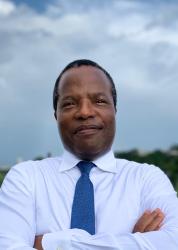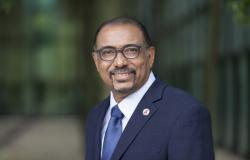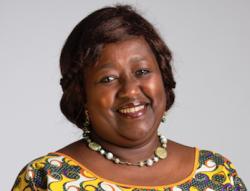

11:00 am EDT - 12:00 pm EDT
Past Event
The rapid spread of the delta variant of COVID-19 has made the successful rollout and uptake of vaccinations against the disease around the world more urgent than ever. Through regional cooperation and tough national actions, among other factors, the African continent has made impressive strides toward preventing the devastating impacts of the pandemic seen elsewhere. However, recent months have seen massive upticks in case numbers as containment measures are relaxed and global travel resumes. In fact, the region has now counted over 7 million cases, and this number is rising rapidly, alongside large numbers of tragic and preventable deaths.
Already, regional institutions, led by the Africa Centers for Disease Control and Prevention, the African Union, the African Export-Import Bank, and the United Nations Economic Commission for Africa, have worked tirelessly to obtain much-needed medical supplies, ventilators, diagnostic tests, and personal protective equipment, among other essential materials, in order to shore up Africa’s defenses against the virus. Of course, one of the most effective tools for combating the spread of the virus is the vaccine, of which many versions now exist.
However, this essential tool continues to be out of reach for most Africans: Indeed, the region is far behind the rest of the world in obtaining and distributing the vaccine due to a myriad of challenges, including inadequacy of vaccine supplies, logistics and capacity constraints within Africa, and vaccine hesitancy. Donations of these vaccines from the U.S., Europe, and many other partners—both bilaterally and through the efforts of COVAX—have increased supplies, but those donations are far too few, and the speed of the vaccine rollout is much too slow to truly blunt the impact of COVID-19 in the region, especially as variants continue to accelerate the spread. In fact, as of this writing, less than 2% of Africa’s over 1 billion people have been fully vaccinated.
The pandemic is far from over and developing countries lack access to important tools to control the COVID-19 virus. Given this pressing challenge, on September 15, the Africa Growth Initiative (AGI) hosted Dr. Agnes Binagwaho, vice-chancellor of the University of Global Health Equity, and the Hon. Dr. Michel Sidibé, the special envoy for the African Medicines Agency of the African Union, for a discussion on approaches for accelerating vaccinations against COVID-19 in Africa, including strategies for procuring the vaccine, financing the rollout, and reaching as many people as possible. The event was moderated by Aloysius Uche Ordu, senior fellow and director of the Africa Growth Initiative at Brookings.
Ordu began the event emphasizing the massive, tragic losses the COVID-19 pandemic has had on families around the world and on countries’ economies—not least in Africa. Ordu noted:
“What the world desperately needs right now is global solidarity to avert human tragedy. Instead, we are witnessing the emergence of a two-track world: on the one hand, the rich and vaccinated; on the other hand, the poor and unvaccinated. That’s a recipe for disaster—a dangerous world for the rich and poor alike in view of the rapid emergence of variants.”
Ordu then posed the central question: “How can the global community best support Africa—and the developing world—in overcoming the virus once and for all?”
Both Sidibé and Binagwaho echoed Ordu’s sentiments in their opening statements, emphasizing the vast inequity in vaccine procurement and distribution. In fact, as Binagwaho highlighted, by the end of 2021, the “rich” world will have 1 billion doses stored—likely leading to a situation where those doses expire instead of being shared with the rest of the world. Sidibé also stressed the extreme inequity in access, even calling the current situation “vaccine apartheid,” and explained how the COVID crisis has highlighted and exacerbated existing inequalities of wealth, health, well-being, social protection, and access to basic needs like food, health care, and education—both within countries and across the world.
Both panelists warned that the issue of vaccination has become a global political pain point. Sidibé urged, in response to this trend, that leaders think about medicine as a public good, calling for a conversation around the democratization of health and describing this vaccine inaccessibility as a “denial of the right to medicine.” Binagwaho agreed, warning that politics have begun to overtake the science of the pandemic, leading to a situation where the Western world has become comfortable giving their populations booster shots while only 3% of the developing word has been able to procure any.
The conversation closed with a discussion around the role of the private sector and nongovernmental organizations (NGOs) in accelerating vaccine access for the continent. Sidibe called for a bridge between public institutions and the private sector for successful social change. He expressed that the private sector can be key for addressing this and similar crises and called for new partnerships that will allow the private sector to more effectively contribute to social transformation. Binagwaho also remained positive regarding the potential of the private sector to address health crises, noting its important role in ending the Ebola crisis of 2014. However, she also warned that, in line with Sidibé’s call for strengthened partnerships, while the private sector has mobilized funds and given donations in the past, it has needed to be backed by the African Union to be successful. Indeed, health expenditures in the region are among the highest in the world—a situation which too often pushes people into poverty.
Finally, Binagwaho emphasized the importance and flexibility of NGOs in pandemic response: Sometimes they are implementers, service deliverers, or advisers of communities depending on what is needed of them. Sidibé further agreed, adding the vital role civil society plays in enhancing accountability.
The panel concluded the event with a call for self-sufficiency for African countries, stating that the region will continue to face major challenges when addressing this and future crises, such as climate change.
Moderator

Panelist



Belinda Archibong, Peter Blair Henry
April 18, 2024

Witney Schneidman
April 17, 2024

Douglas A. Rediker
April 15, 2024